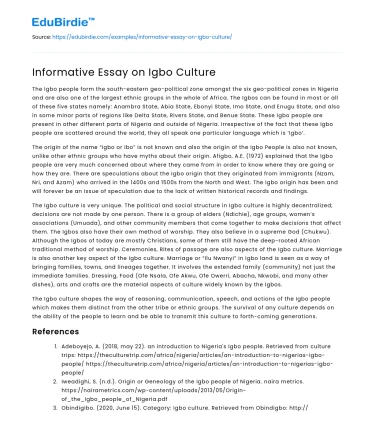The Igbo people form the south-eastern geo-political zone amongst the six geo-political zones in Nigeria and are also one of the largest ethnic groups in the whole of Africa. The Igbos can be found in most or all of these five states namely: Anambra State, Abia State, Ebonyi State, Imo State, and Enugu State, and also in some minor parts of regions like Delta State, Rivers State, and Benue State. These Igbo people are present in other different parts of Nigeria and outside of Nigeria. Irrespective of the fact that these Igbo people are scattered around the world, they all speak one particular language which is ‘Igbo’.
The origin of the name “Igbo or Ibo” is not known and also the origin of the Igbo People is also not known, unlike other ethnic groups who have myths about their origin. Afigbo, A.E. (1972) explained that the Igbo people are very much concerned about where they came from in order to know where they are going or how they are. There are speculations about the Igbo origin that they originated from immigrants (Nzam, Nri, and Azam) who arrived in the 1400s and 1500s from the North and West. The Igbo origin has been and will forever be an issue of speculation due to the lack of written historical records and findings.
Save your time!
We can take care of your essay
- Proper editing and formatting
- Free revision, title page, and bibliography
- Flexible prices and money-back guarantee
The Igbo culture is very unique. The political and social structure in Igbo culture is highly decentralized; decisions are not made by one person. There is a group of elders (Ndichie), age groups, women’s associations (Umuada), and other community members that come together to make decisions that affect them. The Igbos also have their own method of worship. They also believe in a supreme God (Chukwu). Although the Igbos of today are mostly Christians, some of them still have the deep-rooted African traditional method of worship. Ceremonies, Rites of passage are also aspects of the Igbo culture. Marriage is also another key aspect of the Igbo culture. Marriage or “Ilu Nwanyi” in Igbo land is seen as a way of bringing families, towns, and lineages together. It involves the extended family (community) not just the immediate families. Dressing, Food (Ofe Nsala, Ofe Akwu, Ofe Owerri, Abacha, Nkwobi, and many other dishes), arts and crafts are the material aspects of culture widely known by the Igbos.
The Igbo culture shapes the way of reasoning, communication, speech, and actions of the Igbo people which makes them distinct from the other tribe or ethnic groups. The survival of any culture depends on the ability of the people to learn and be able to transmit this culture to forth-coming generations.
References
- Adeboyejo, A. (2018, may 22). an introduction to Nigeria's Igbo people. Retrieved from culture trips: https://theculturetrip.com/africa/nigeria/articles/an-introduction-to-nigerias-igbo-people/ https://theculturetrip.com/africa/nigeria/articles/an-introduction-to-nigerias-igbo-people/
- Iweadighi, S. (n.d.). Origin or Geneology of the Igbo people of Nigeria. naira metrics. https://nairametrics.com/wp-content/uploads/2013/05/Origin-of_the_Igbo_people_of_Nigeria.pdf
- Obindigibo. (2020, June 15). Category: Igbo culture. Retrieved from Obindigbo: http://obindigbo.com.ng/category/igbo-culture/ http://obindigbo.com.ng/category/igbo-culture/
- Ohadike, J. C. (1996). Igbo Culture and History. Womrel, 18-49. https://womrel.sitehost.iu.edu/REL%20300%20Spirit/REL%20300_Spirit/Igbo%20Culture%20and%20History.pdf
- Ojiaku, M. O. (2015). The Igbo People: Culture and Character. U.S.A: Booklocker.com, Inc. https://assets.booklocker.com/pdfs/8047s.pdf






 Stuck on your essay?
Stuck on your essay?

